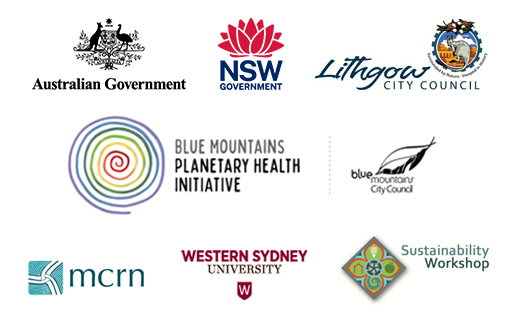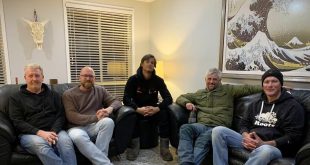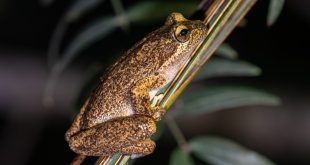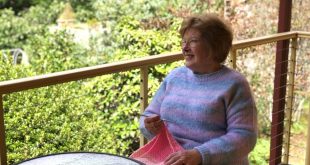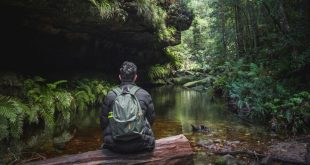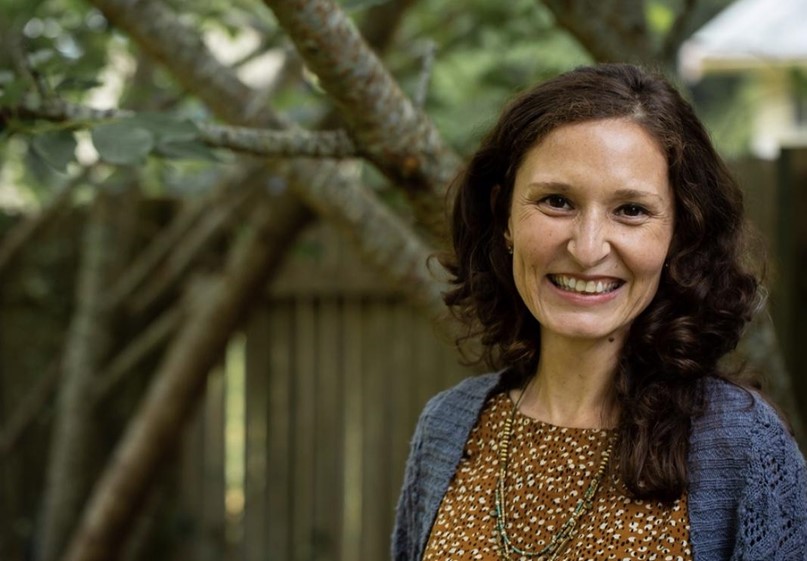
Mishy Rowan (photo supplied)
Story and photos by Belle Butler
Eco anxiety, as a response to the environmental crisis, is an emerging area of study for psychologists, and art therapy is a potential salve for sufferers. Meet Mishy Rowan, and find out what happens when art meets science.
Key Points:
- Eco anxiety is a type of anxiety that results from witnessing the destruction of our environment.
- Eco anxiety is experienced at higher levels by younger people, higher educated people and women.
- A bit of eco anxiety can lead to action and choices that help the planet, while too much can lead to burnout, eco-paralysis or inaction. Art is one way to temper high levels of anxiety.
Art therapist Mishy Rowan of Lawson knows first-hand the power of art therapy. When surgery left her experiencing severe and ongoing pain, Mishy discovered that while painting, her pain disappeared. In a classic lightbulb moment, she connected art with therapy and could see how the act of being creative might help humans overcome life’s challenges.
She subsequently left her career in IT and, after completing a Master of Art Therapy, began her practice helping others use art to overcome challenges and improve wellbeing.
Now well established in her art therapy practice, Mishy is undertaking a Master of Psychological Practice. Her thesis is focused on eco-anxiety in response to the environmental crisis, whether it can be differentiated from general anxiety and how it can be measured. I had a chat with Mishy about her findings.
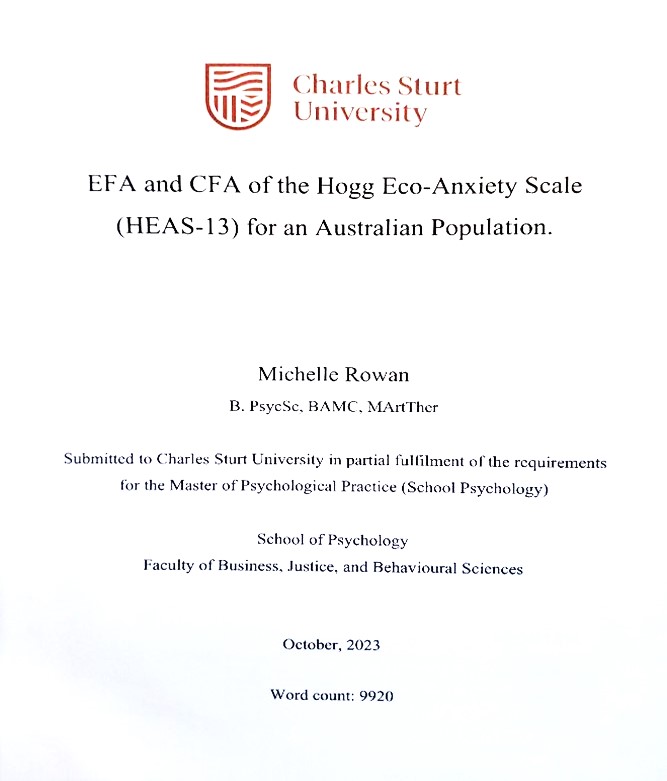
Title page of Mishy’s thesis.
Q: Can you tell me about the aim of your thesis?
Eco-anxiety is an emerging area of research and there’s a debate about whether eco-anxiety can (and should) be differentiated from general anxiety. So, the aim of my research was to investigate whether an eco-anxiety scale could be used as a valid tool for measuring eco-anxiety in the general population.
In psychology research, measurement tools help researchers gather empirical data. This allows us to analyse and understand aspects of human behaviour, cognition and emotions. Having a robust tool to measure eco-anxiety allows researchers and clinicians to identify vulnerable populations and tailor interventions accordingly.
My interest in this area grew out of one of the big questions in psychology around this topic: are therapists equipped to deal with the climate crisis? Whilst debate continues about this, my research was sparked by a desire to be able to answer this question with a confident ‘yes’.
Q: How is eco anxiety different to generalised anxiety?
Anxiety disorders can be characterised by persistent, excessive and often irrational worry or fear that significantly interferes with a person’s daily life. Eco-anxiety is theorised as a multidimensional construct which includes affective symptoms: that’s our emotions; behavioural symptoms: like losing sleep; rumination: so being unable to stop thinking about the environment; and anxiety about our personal impact on the planet.
Eco-anxiety has this existential element to it, which is the destruction of our environment. Similarly, much of therapy focuses on the intrapersonal: how we are inside; or the interpersonal: how we are in relationships. So eco-anxiety doesn’t fit neatly into these aspects as it’s a societal issue, it’s a global issue.
With eco-anxiety – because the environmental threat is real – it isn’t just about managing my emotions, improving my relationships, or changing my perspective on something. For some, the health of the planet is intrinsically linked to human health, which includes our mental health.
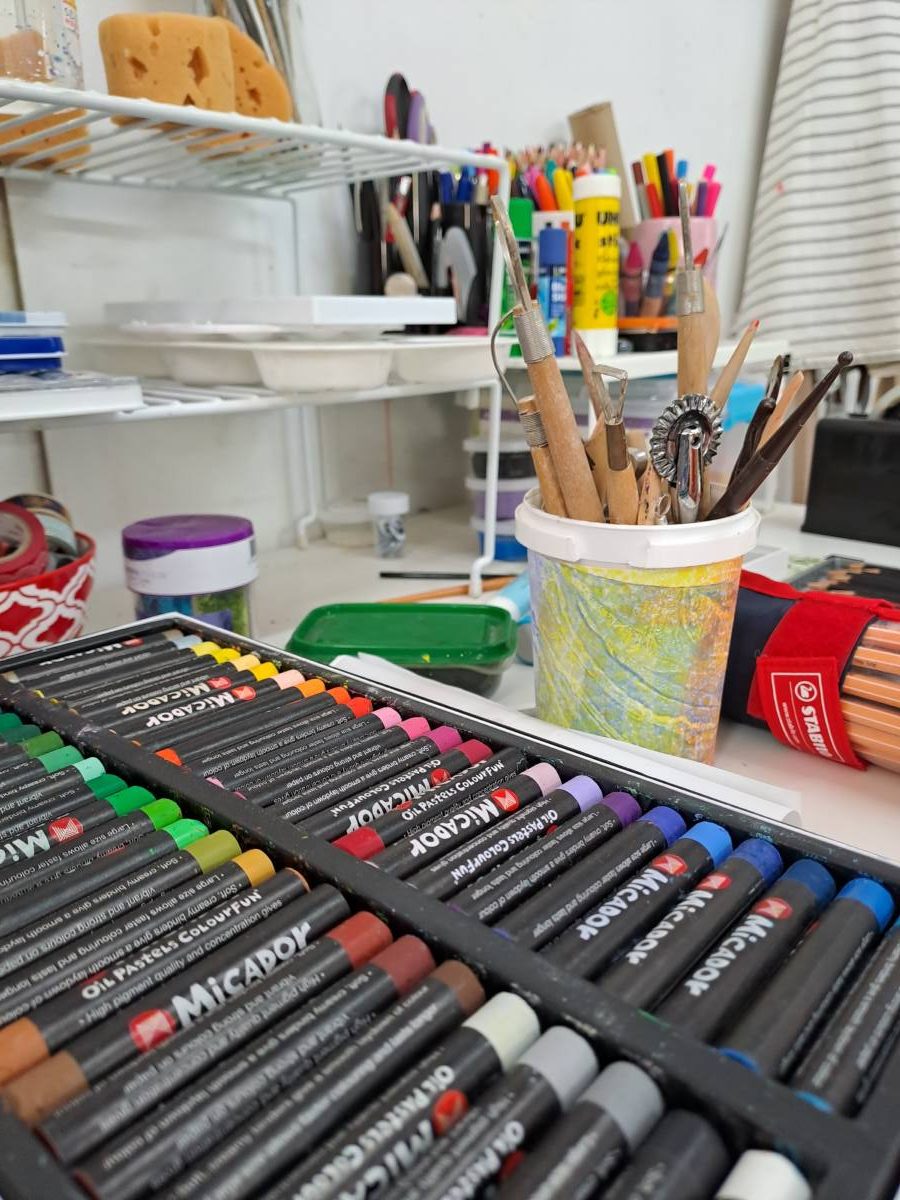
Art therapy tools at Mishy’s studio.
Q: So the scale you were testing in your thesis was different to a standard anxiety scale?
Yes. There’s a researcher in Australia who produced a scale that attempts to capture the multidimensional aspects of eco-anxiety. So far, the scale has only been tested within a small university sample. So my study replicated and extended the original study, with the aim of verifying the scale for use with a broader population.
Q: And what did your study find?
The study suggests that people resonate with the term eco-anxiety and that younger people, higher educated people, and women, tend to experience higher eco-anxiety levels. But within a broader population, we’re not 100% sure if the four constructs of the scale are necessarily the best way to capture eco-anxiety. So, as with most research, there is more work to be done!
Q: Was that a surprising outcome?
What was really interesting was that people relate to the term eco-anxiety differently across the generations. Older generations don’t necessarily relate to the term and the scale captured low levels of eco-anxiety amongst older populations, yet they tend to recycle more and be more conservative in their consumption, which reduces their carbon footprint.
Younger people tend to experience higher levels of eco-anxiety. At the same time, they’re actually recycling less and they’re consuming more (ie. fast-fashion, technology). So, they might be very worried about the environment, but their behaviours don’t always reflect that.
I was also surprised to see that a small percentage of the population indicated that they experience eco-anxiety every day. It’s a small but meaningful percentage with potential real-world consequences. For example, young people are being admitted into eating disorder clinics. They’re so concerned about the planet’s health that they have stopped eating. Whilst there are likely other factors at play that lead to hospitalisation, for some, eco-anxiety appears to be a contributing factor that may require a different treatment approach.
But what I found really encouraging is that, through the course of my research, I connected with a community of psychologists and art therapists who deeply care about the impact of climate change on our mental health. There is a whole community of health workers who are working hard to help individuals and communities manage the impact of climate change, and who are exploring better ways of supporting all of us through these changes.
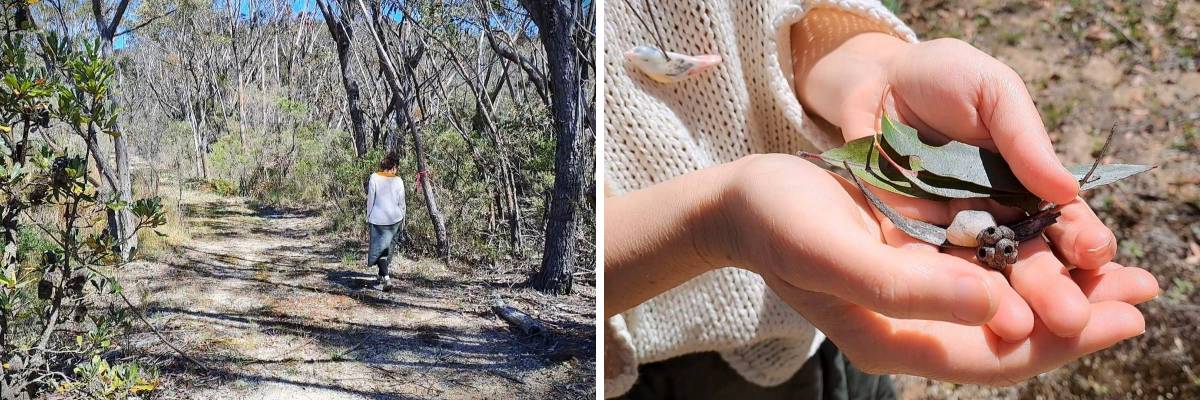
Mishy collecting items to use in the creation of her ‘nature ring’, an artwork activity she uses to process feelings of eco-anxiety.
Q: At best what function do you think eco anxiety can serve and at worst what damage can it do?
A little bit of eco-anxiety can be quite helpful. It may be motivating and help us to engage in pro-environmental behaviours, like recycling or activism. However, too much anxiety can lead to overwhelm, which may lead to ‘eco-paralysis’, where we become stuck. So, we need to find that sweet spot where anxiety is adaptive, where it helps to energise us and promotes change without overwhelming us.
At worst, eco-anxiety could mask general anxiety. It’s possible that one may hyper-focus on something external, such as the environment, whilst avoiding interpersonal or intrapersonal challenges that may be more related to general anxiety.
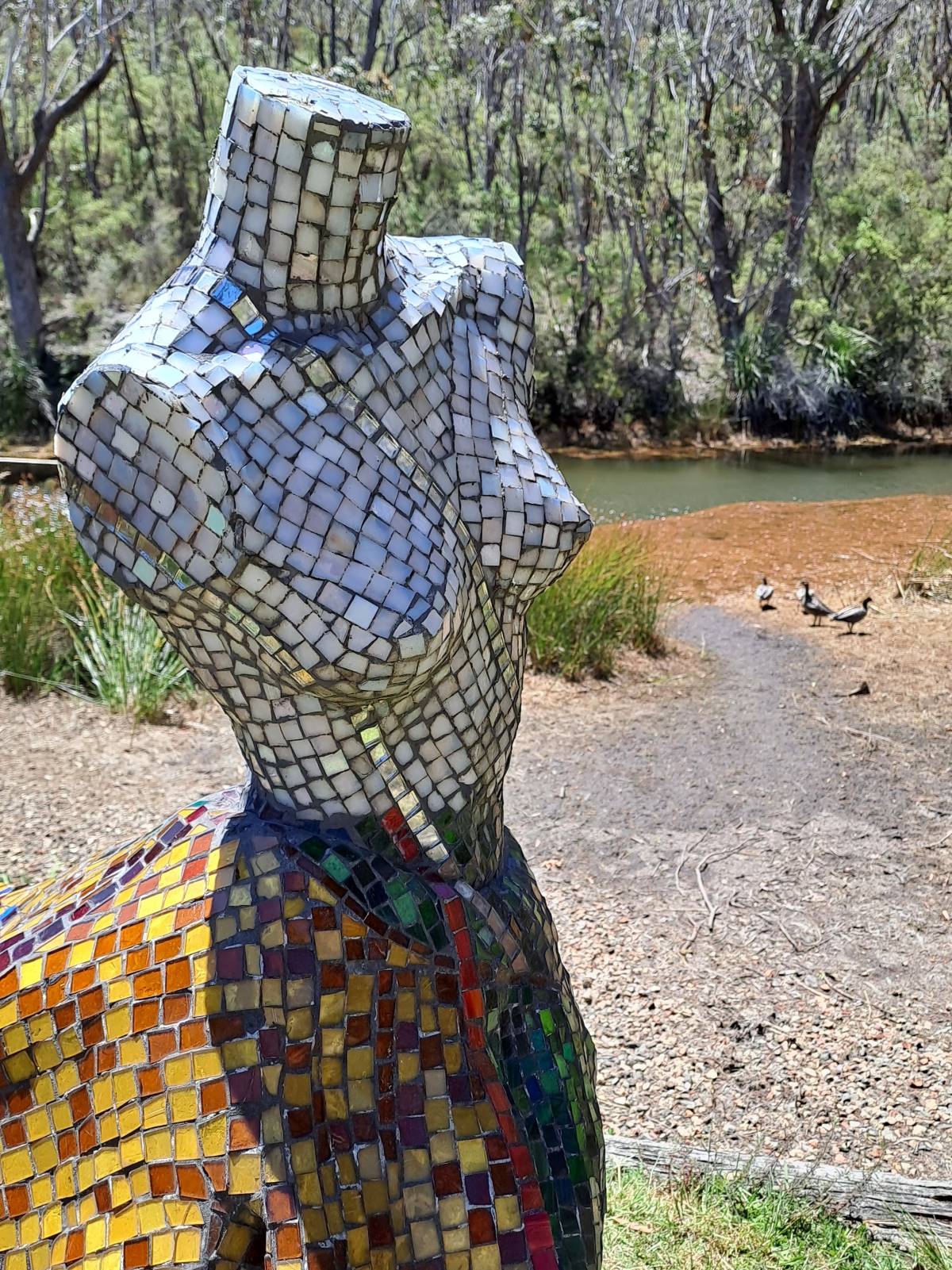
Sculpture and serenity on the grounds of Wild Valley Art Park in Wentworth Falls where Mishy has her art therapy practice.
Q: Do you see art therapy as a useful tool for eco anxiety?
Sometimes, when words are difficult to express, art making can be a useful form of non-verbal expression. Because of the abstract nature of climate change, it’s sometimes difficult to process these complex, existential feelings.
Art has been shown to have the potential to take abstract ideas and terms around climate change and present them in a way that’s more accessible for people. It also allows a direct connection to nature through the thoughtful collection and integration of natural elements in our artworks.
Q: Any other tips for dealing with eco anxiety?
While repairing the planet is a group effort, there are some things that we can do to help reduce symptoms of eco-anxiety. As individuals, it can be helpful to take control of our engagement with climate news and avoid ‘doom-scrolling’ to prevent overload.
Getting out in nature and participating in community events, be it activism or just sharing space with like-minded people, can also be beneficial. Expressing our concerns is also important. This might include talking with friends, family or a therapist, or writing, making art or music to help process our feelings so they don’t get trapped.
For me, what drives a lot of eco-anxiety is the question: is it on me to fix everything? The burden of that question can lead to overwhelm. So, my approach is to focus on the things I can control. I can’t necessarily change the amount of fast-fashion produced, but I can choose to upcycle, recycle and repair where possible, and importantly, to practice self-compassion when it is just not possible. Focusing on what’s in my control helps me to feel a sense of achievement which can reduce anxious feelings.
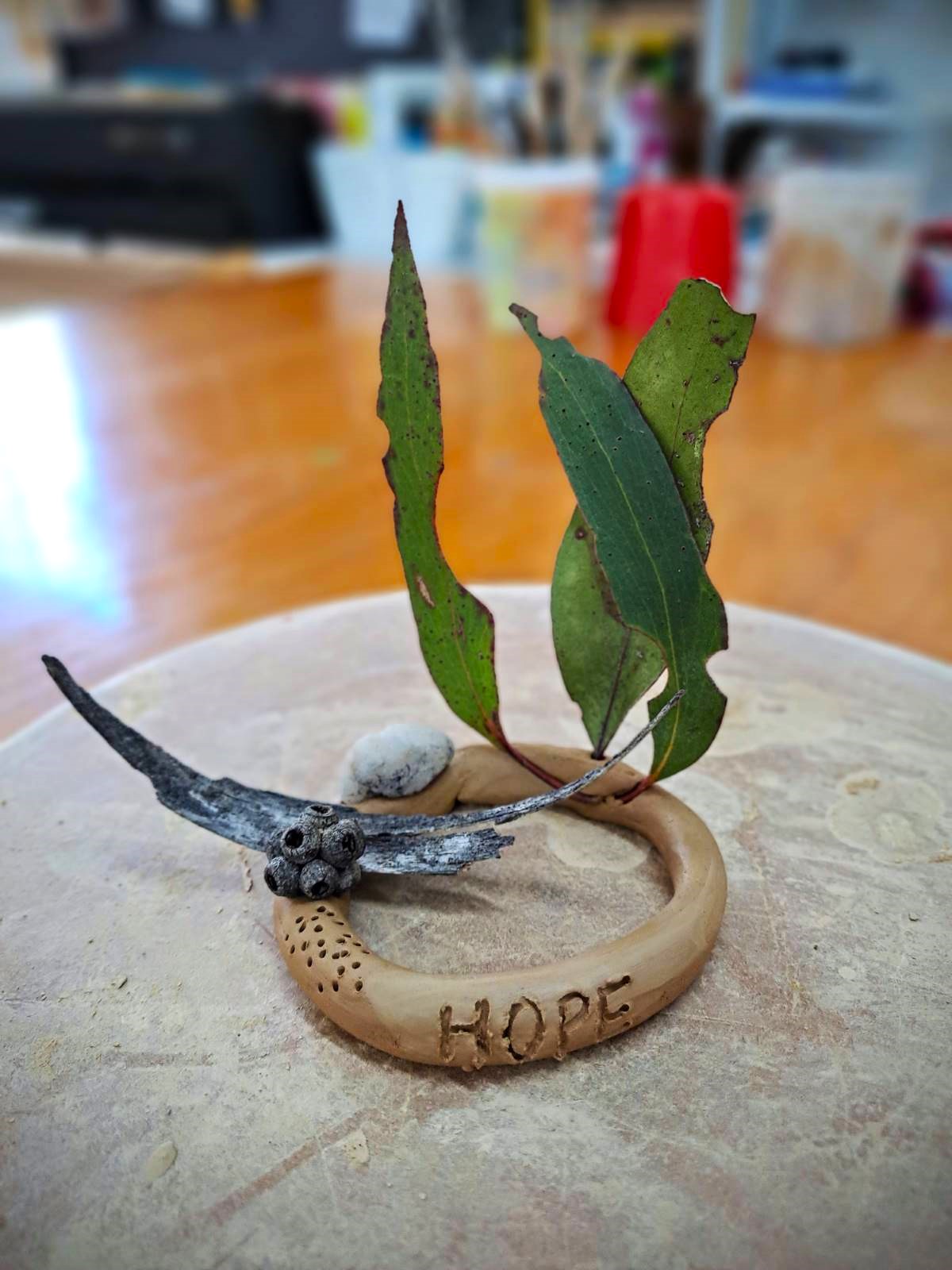
Mishy’s ‘nature ring’ that reflects her feelings about the environment.
How to make a nature ring
Mishy’s details if you would like to get in touch:
Mishy Rowan, Art Therapist
Take Action:
- To learn more about eco-anxiety and how you can best manage its effects or find support, you can visit:
- Other ways to find help:
Share this article:
This story has been produced as part of a Bioregional Collaboration for Planetary Health and is supported by the Disaster Risk Reduction Fund (DRRF). The DRRF is jointly funded by the Australian and New South Wales governments.
